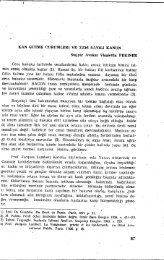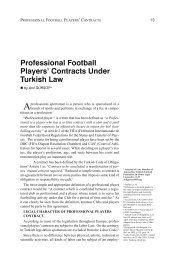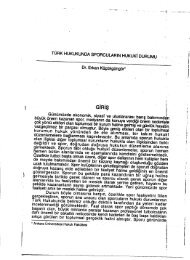The Turkish Cypriot Legal System from a Historical ... - Ankara Barosu
The Turkish Cypriot Legal System from a Historical ... - Ankara Barosu
The Turkish Cypriot Legal System from a Historical ... - Ankara Barosu
You also want an ePaper? Increase the reach of your titles
YUMPU automatically turns print PDFs into web optimized ePapers that Google loves.
102<br />
ankarabarrevıew 2010/1<br />
1. <strong>The</strong> <strong>Turkish</strong> <strong>Cypriot</strong> <strong>Legal</strong> <strong>System</strong> in the Early British Era<br />
(1878-1914)<br />
<strong>The</strong> Early British Era in Cyprus refers to the period in which the<br />
island was governed by Britain, but was still owned by the Ottoman<br />
Empire, per the enabling convention signed between the two countries.<br />
<strong>The</strong>refore in theory, it may be expected that the Ottoman legal<br />
system would still be still in force on the island. But history disagrees.<br />
Although the island was still considered as an Ottoman property; the<br />
British authorities, after taking over the governance of the island, started<br />
to effectuate some legislative activities which slowly caused the<br />
Ottoman legal system to be replaced by British law. 50 <strong>The</strong>se compulsory<br />
legislative activities, aimed in essence at administering the island,<br />
caused the Ottoman law to slowly begin to fade, and British law began<br />
to take its place as the legal system to which <strong>Turkish</strong> <strong>Cypriot</strong>s were<br />
subjected. It is difficult to make a case for the presence of “<strong>Turkish</strong><br />
<strong>Cypriot</strong> Law” in this period. However <strong>Turkish</strong> <strong>Cypriot</strong> Law did indeed<br />
exist nonetheless, as the British administration did not, for a while,<br />
abolish the competency of the Islamic courts (Şer’iye mahkemeleri)<br />
with regard to cases between Muslims as well as of those special<br />
courts for non-Muslims, also the British Administration did not cancel<br />
the Ottoman Code of Civil Law (Mecelle). 51<br />
In fact, the British Administration established a new legal system<br />
when they arrived at the island. 52 Criminal disputes were of great importance<br />
for the British in order to establish public order on the island<br />
when they first arrived. For instance, the Penal Code which was introduced<br />
during the Ottoman Reforms of 1858, and was largely modeled<br />
after the criminal code of France and was in force in all parts of the<br />
Ottoman Empire, was kept in force in order to maintain the criminal<br />
law system on the island. On the other hand, the competence of<br />
the Islamic courts with regard to cases between Muslims, and that of<br />
Community Courts with regard to family law cases of non-Muslims<br />
remained valid. 53 <strong>The</strong> Ottoman Code of Civil Law, regulating civil<br />
law and property law of the Ottoman Empire, was applicable as well.<br />
<strong>The</strong> British kept this division and only limited it with respect to family<br />
law disputes and kept the Penal Code in force. 54 However, “itinerant<br />
tribunals”(Gezici Mahkeme), “regional courts” and “high courts” as<br />
courts of appeal were established by the British administrators shortly<br />
after receiving control of the island – probably in 1879 – which were<br />
envisaged to have jurisdiction over all other sorts of disputes. 55 Those<br />
high courts would be regarded as the courts of last instance of all legal<br />
50 NEOCLEOUS, p. 11.<br />
51 NEOCLEAUS, p. 11.<br />
52 NEOCLEOUS, p. 11.<br />
53 An, p. 87; NEOCLEAUS, p. 11.<br />
54 NEOCLEOUS, p. 11.<br />
55 TORNARİTİS, C.G. : <strong>The</strong> <strong>Legal</strong> <strong>System</strong> of the Republic of Cyprus, Nicosia 1984, p. 74; Neocleous, p. 11.
















